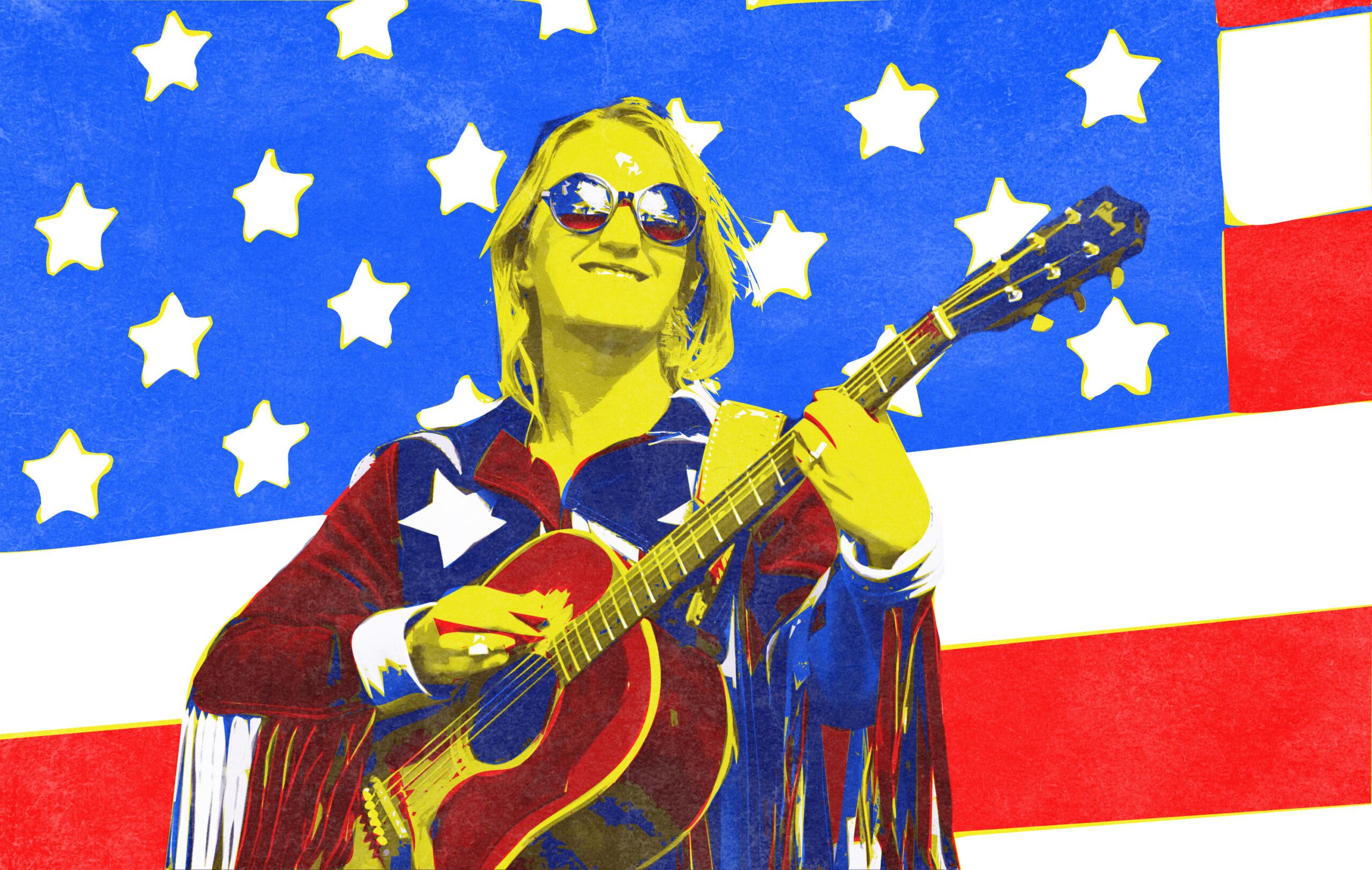
Margo Price is on a mission to reclaim the term economic anxiety. In the death throes of the 2016 election, those words became a bitter punch line, shorthand for the fierce argument about the true motivations of those who voted for President Donald Trump. But Price is a sharp and deceptively soothing country singer adept at making phrases you’ve heard thousands of times radiate with new urgency, turning the political into something deeply personal. That’s evident throughout her new album, this week’s All American Made. Particularly the song called “Pay Gap.”
“Pay Gap” is breezy and gentle, bolstered by jolly accordion and the assured lilt of Price’s voice. She can summon the tart pugnaciousness of Tammy Wynette or the bazooka-voiced grandeur of Neko Case at will, but that only makes her moments of restraint hit harder. “Honey, I work so hard for my money / And I leave my baby at home,” the first verse begins, quickly winding up to the grim sentiment “But at the end of the day, it feels like a game / One I was born to lose / In this institution, a dead revolution is giving young women abuse.”
The chorus switches to waltz time, the vibe even gentler as Price coos, “Pay gap, pay gap / Why don’t you do the math? / Pay gap, pay gap / Rippin’ my dollars in half.” The second verse keeps the chill vibe despite getting both surlier and more historically specific, with Price scoffing at the very notion of “equal pay”; from the second chorus on, she switches the first line up to “Pay gap, pay gap / Don’t give me that feminism crap,” delivered lovingly, as though she’s singing her wedding vows. The last verse, in full:
No matter your religion, no matter your race
No matter your orientation
No matter your creed and no matter your taste
And no matter your denominationWe’re all the same in the eyes of my God
But in the eyes of rich white men
I’m no more than a maid to be owned like a dog
And a second-class citizen
“I don’t feel angry when I’m singing it, because that song is in a major key,” Price told the website Aquarium Drunkard earlier this month. “It’s happy. It’s disguising the message with something a little more digestible that’s pumped full of sugar because of the medicine that no one wants to take. I think it actually makes me feel calmer when I sing that song, because I feel like, ‘Okay, I’m doing some small part to make people aware.’”
Born in Illinois and based in Nashville, Price records for Jack White’s Third Man Records, which leads one to the reasonable assumption that she’s Jack White’s idea of a modern-day country singer: throwback-minded but fiery and forward-looking, an analog prophet for digital times. At 34, she’s lived just a little more, and a little harder, than most young country singers; her songs might grapple with the loss of a child, or the loss of her family farm, or her years in the unsigned-artist Nashville wilderness. Her debut album, last year’s Midwestern Farmer’s Daughter, nonetheless played out like a triumph, and got her both plenty of critical attention and a gig on Saturday Night Live, belting out the bright and bumptious “Hurtin’ (on the Bottle),” and briefly transforming NYC into Fist City.
But this week’s All American Made, buoyed by “Pay Gap” and 11 other songs that stir the sugar you want and the medicine you need into an intoxicating brew, is even better. It’s one of the best country records of the year, radiating both honky-tonk rambunctiousness and elegant church-pew soul, with tasteful bursts of gospel and country funk. Writing most often with her husband, Jeremy Ivey, Price has a knack for killer one-liners suitable for sewing into throw pillows or scrawling onto dive-bar-bathroom walls: “Sometimes my weakness is stronger than me.” “A little pain never hurt anyone.” “If you drink all night, you’ll be thirsty all day.” “Is winning really learning to lose?” Most of those are delivered with a wink, a shrug, an amiable lope. But when Price turns on the fire hose, as on the booming climax of “A Little Pain,” look out.
That All American Made features a duet with Willie Nelson is not, in and of itself, remarkable. Willie, god bless him, has a habit of popping up anywhere, with anyone, with results that always soothe you but rarely shock you. But “Learning to Lose” tweaks the formula just slightly, the tone just a click more poignant than his usual guest-star turn. Price and Nelson’s voices mesh beautifully without quite interlocking, a rapport all the more convincing for how lonesome they both sound.
The resulting song joins “Pay Gap” in bucking against the system: “Everywhere I turned, the cards were stacked against me / And I wondered was it bad luck or just design.” Elsewhere, Price sings about losing her beloved childhood farm on “Heart of America,” which climaxes with the line “They took every field my family owned.” The rowdier “Wild Women” is a celebration of those women and a declaration that Price stands among them, though the price is high, and once again higher for her than it oughta be: “It’s hard to be a mother, a singer and a wife / But all the men, they run around and no one bats an eye.”
From Lydia Loveless’s “Midwestern Guys” to Miranda Lambert’s “Bathroom Sink” to more radio-friendly fare like Maddie & Tae’s “Girl in a Country Song,” you can find other, newer country songs that eloquently lament a woman’s place in the world. In Price’s corner of Nashville, you can find other left-leaning or at least counterculture-friendly critics’ darlings like Todd Snider or Aaron Lee Tasjan or even golden boy Jason Isbell. But it’s still rare, and still a genuine thrill, to watch someone kick at the glass ceiling with Price’s aplomb and specificity. All American Made, with all its sentimental grit and musical restlessness, calls to mind A Sailor’s Guide to Earth, last year’s Grammy-winning hit from Sturgill Simpson, another restless outsider who scares up a goodly amount of Real Country Music praise but refuses to confine himself to a lane that narrow. It’s tempting to lament that Price will likely not get as towering a critical platform as Simpson, and certainly not much country-radio play, injustices attributable to a cultural version of the same pay gap she sings so vividly about.
But to hail her as unfairly underrated is a backhanded compliment; as she and Willie put it, “Sometimes a blessing is a curse in disguise.” At its best, this record painfully and expertly sharpens the distinction between counting your sorrows and succumbing to them, between shaming your societal oppressors and allowing them to victimize you. “Sometimes I’m Virginia Woolf / Sometimes I’m James Dean,” Price howls on “Weakness,” as thrilling a declaration of strength as you could ask for, sung by a clear-eyed rebel more than capable of rallying you to her cause.

